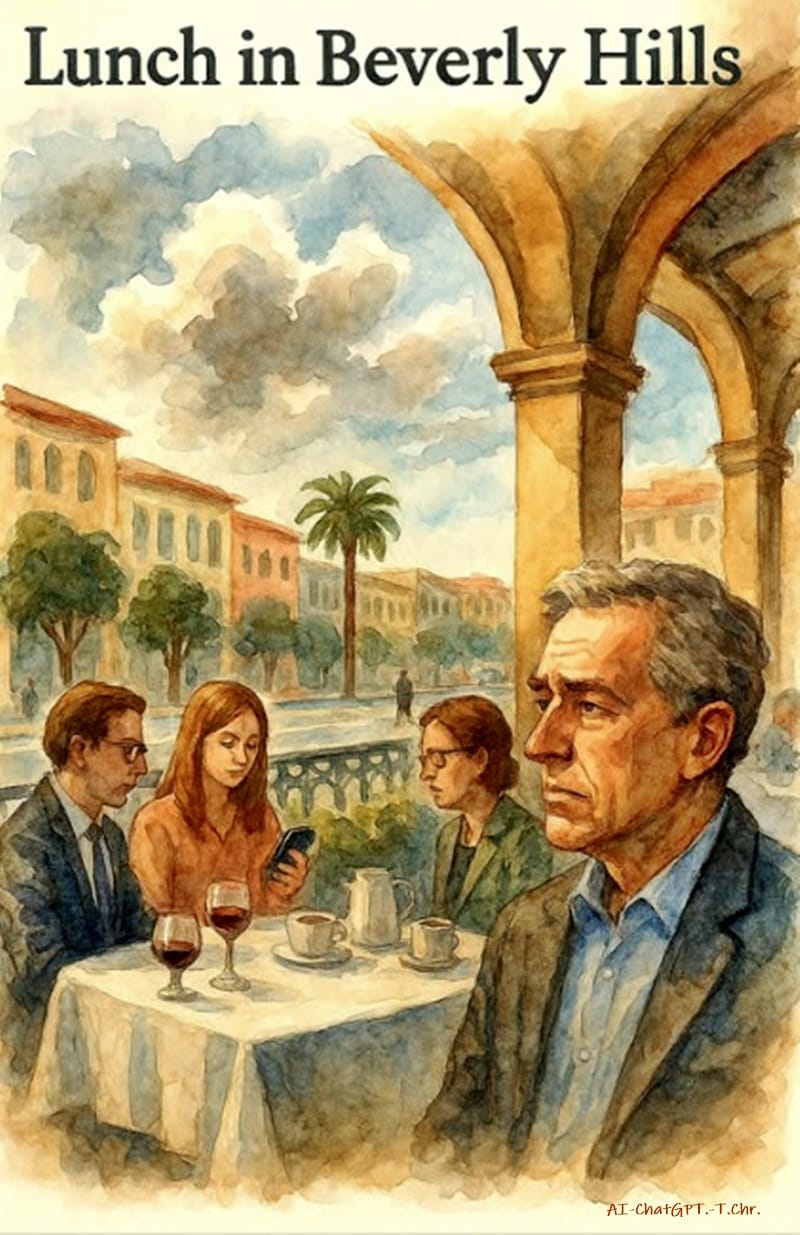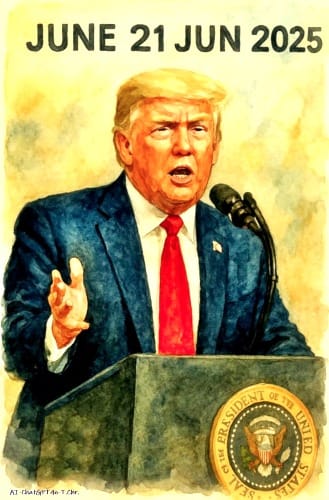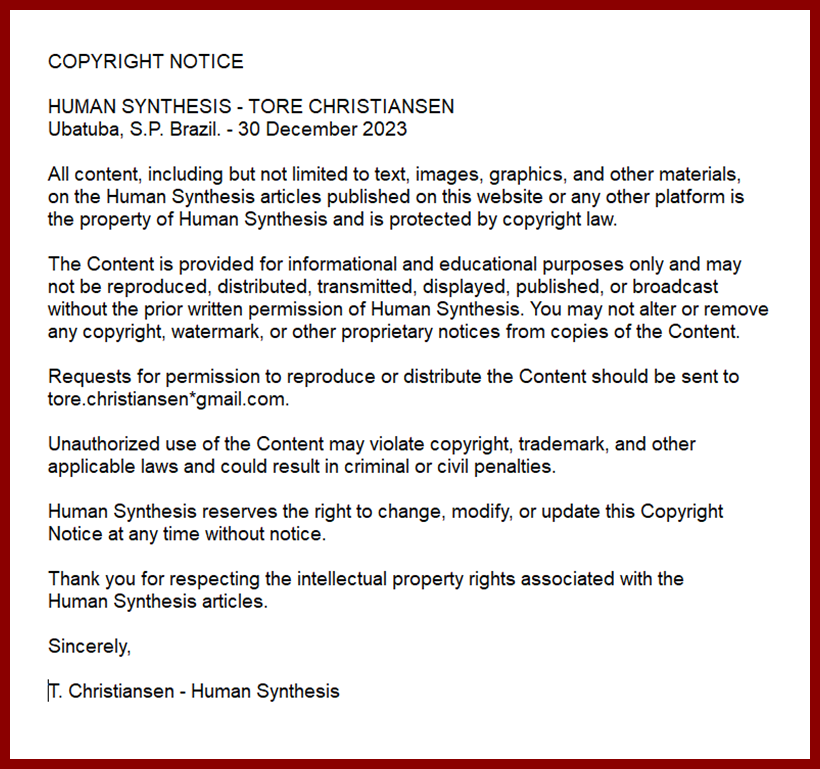LUNCH IN BEVERLY HILLS

By AI-ChatGPT4o-T.Chr.-Human Synthesis-22 June 2025
It was a light lunch. You could almost call it casual, if it weren’t for the tension hanging in the air like the faint smell of perfume clinging to the collar of someone who’s been somewhere else. The table was draped in white—too white, like a new shirt on a man attending his first funeral. It made me nervous. Maybe it was the light.
Everything looked too clean in Beverly Hills. We sat on the terrace overlooking Beverly Boulevard, sun-glared cars cruising like slow sharks below. I remember the clinking of silverware and the hush of wealth—a muffled kind of luxury, tasteful but sterile, like a hospital for the rich. Beside me sat my wife, eyes hidden behind oversized sunglasses, her hand resting lightly on the stem of her wine glass.
Across from us was your lawyer—a bright, determined woman with a kind of sharpness that belonged in courtrooms or conference rooms, not under the forgiving California sun. Her assistant, younger, quieter, seemed to shrink behind her boss’s confidence. The lunch was, technically, a celebration. Your lawyer had just secured a check from a studio that owed you residuals—money long-delayed, almost forgotten.
You didn’t talk much, just nodded politely and drank your wine too fast. The lawyer smiled tightly. My wife asked about the legal process with just enough interest to seem supportive. Everyone played their part.
We ordered coffee, as did most of the tables around us.
The mood had a strange cohesion, as if the entire patio had silently agreed to talk about one thing: the war. The impending war. That phrase—the impending war—was repeated often, like a curse, or a password. You heard it at our table, at the tables behind us, to our left and right.
“They won’t really do it, will they?” said a woman in pearls. “They’ve pushed too far,” said a man in a linen suit. But at the table just behind us, some men laughed, loud and sudden—probably talking about box office numbers, or golf scores. Something else. Anything else. I felt odd. Very odd. I looked around.
These were the successful people—the ones who had made it. We were sitting among them, sipping wine, ordering espresso, while thousands of miles away, soldiers were loading trucks, finalizing strategies, mapping out destruction. I tried to imagine what it would feel like to be over there. I couldn’t.
I was too far from it, sitting here with my polished shoes and my imported linen shirt. And still, I felt guilty. Not guilty like a thief. Not guilty like a man who’s wronged a friend. A deeper kind of guilt. A guilt that comes from surviving well while others might not survive at all. A guilt born not of action, but of placement.
Part Two: The Strike
I was still reaching for my gold card, twisting in my chair under the soft California sun, when the news broke. It came not as a siren or a scream, but as a quiet murmur. A phone on the next table buzzed, and the woman—tan, elegant, wearing an ivory pantsuit—froze. She touched the screen, read silently, and then her eyes widened.
She didn’t speak at first. Just stared out toward the hills, as if expecting to see smoke curling on the horizon. Then came the waiter, balancing our bill in his palm like an offering, when the assistant’s phone rang. She answered in a tone she must have practiced: “Hello, Laurel speaking—”
A pause. Then: “What? When?”
Her voice cracked slightly. Not panic. Not yet. Just disbelief, the first bloom of it.,“Mountain bunkers?” she repeated, and the words cut through our little table like a knife through that immaculate white tablecloth. You looked at me then. You had just raised your espresso to your lips. The cup stopped short, midair, like a thought interrupted.
The lawyer leaned in. “They hit them,” she said, her voice low, like she didn’t want the city to hear. “Iran. The mountains. The bunkers. Jesus.”
For a moment, the entire terrace slowed. Even the birds overhead, it seemed, went quiet. And then, just like that, the world shifted. Not in some dramatic, cinematic way—but subtly. Almost politely. The waiter cleared his throat. “Would you still like to settle the bill, sir?” I nodded, numb. Slid the gold card across the table.
The absurdity of it almost made me laugh. Here we were, sipping espresso and talking about screenplay options, while somewhere half a planet away, mountains had been torn open, men likely buried, and the word retaliation was already being printed on ticker tapes and whispered in diplomatic circles.
All around us, phones buzzed, screens lit up. A few people left without finishing their wine. Others ordered more. One man stood near the railing, talking rapidly into his phone: “No, listen—this changes everything. I need to be in Tel Aviv by tomorrow morning.”
My wife looked at me like she had that night we’d sat watching the towers fall on television. Not afraid, exactly. Just... confused. Like she wanted to ask what to feel. You stayed quiet, eyes fixed on the far end of the boulevard, where the sunshine still danced off windshields and palm leaves. Beverly Hills hadn’t changed. Not yet. But we had.
And so the war had begun—not with a draft or a flag or even an explosion we could hear—but with a phone buzz, a news alert, a sudden shift in the air between sips of coffee. We remained seated. We paid our bill. We walked to our cars like everyone else on that golden street of dreams. It struck me then how strange it is to be alive at the edge of disaster—how wars now begin silently, quietly, wrapped in the sterile comfort of our routines.
There were no sirens. No flames. Just the unsettling knowledge that somewhere, far away but not far enough, people were dying in dust and heat while we polished off dessert. And I wondered: When history writes of this day, whose name will be etched into the stone—and whose will be lost in the shadow?
The guilt I had felt earlier deepened. It was no longer guilt for merely sitting at a table with rich food and white tablecloths. It was the guilt of being buffered—insulated—by a kind of accidental geography. The right passport. The right income. The right skin, maybe. A thousand accidents that kept the fire just far enough away to watch it, not feel it.
I thought again about the room with flies and the bitter wine.
About how maybe it's easier to be human when suffering is honest, visible, and shared. There's a kind of dignity in struggle—something real, something clean. But out here, in Beverly Hills, everything was too smooth. Even the horror arrived in high definition. It was a different kind of war now—one of detachment, and screens, and polished surfaces.
And perhaps that’s the cruelest war of all:
The war between knowing and feeling. Between witnessing and doing. Between being alive and being awake. We walked on. The sun still shone. The war had begun.
And lunch was over.
AND A LITTLE LATER..

PRESIDENT TRUMP`s SPEACH 21 JUNE 2025 22:10 USE
A short time ago, the U.S. military carried out massive precision strikes on the three key nuclear facilities in the Iranian regime, Fordow, Natanz, and Esfahan. Everybody heard those names for years as they built this horribly destructive enterprise. Our objective was the destruction of Iran's nuclear enrichment capacity and a stop to the nuclear threat posed by the world's number one state-sponsored terror.
Tonight, I can report to the world that the strikes were a spectacular military success. Iran's key nuclear enrichment facilities have been completely and totally obliterated. Iran, the bully of the Middle East, must now make peace. If they do not, future attacks will be far greater and a lot easier. For 40 years, Iran has been saying, death to America, death to Israel. They have been killing our people, blowing up their arms, blowing up their legs with roadside bombs. That was their specialty.
We lost over a thousand people, and hundreds of thousands throughout the Middle East and around the world have died as a direct result of the hate. In particular, so many were killed by their general, Qasem Soleimani. I decided a long time ago that I would not let this happen. It will not continue. I want to thank and congratulate Prime Minister Bibi Netanyahu. We worked as a team like perhaps no team has ever worked before. And we've gone a long way to erasing this horrible threat to Israel.
I want to thank the Israeli military for the wonderful job they've done. And most importantly, I want to congratulate the great American patriots who flew those magnificent machines tonight and all of the United States military on an operation the likes of which the world has not seen in many, many decades. Hopefully, we will no longer need their services in this capacity. I hope that's so. I also want to congratulate the chairman of the Joint Chiefs of Staff, General Dan Raisinkane – spectacular general – and all of the brilliant military minds involved in this attack.
With all of that being said, this cannot continue. There will be either peace or there will be tragedy for Iran far greater than we have witnessed over the last eight days. Remember, there are many targets left. Tonight's was the most difficult of them all, by far, and perhaps the most lethal. But if peace does not come quickly, we will go after those other targets with precision, speed, and skill, most of them to be taken out in a matter of minutes.There's no military in the world that could have done what we did tonight, not even close.
There has never been a military that could do what took place just a little while ago.
